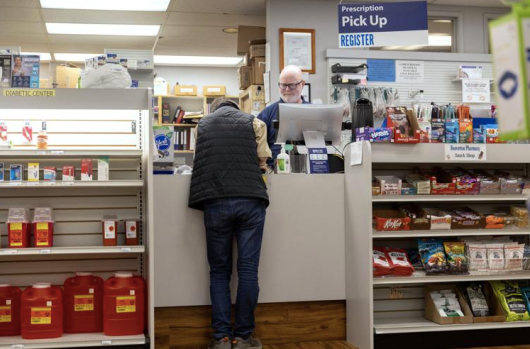Beaverton Pharmacy, other independent pharmacies, struggle to keep afloat
Published 8:06 am Wednesday, May 14, 2025
In an age of brick-and-mortar national pharmacies, small independent pharmacies can struggle to compete.
Such is the case with Beaverton Pharmacy, a business families have been familiar with for years, located conveniently on Canyon Road. The pharmacy is coping with what are called pharmacy benefit managers, or PBMs, which the owner says are an added burden among those that small businesses face.
Owner Wade Irby, who also owns Irby Pharmacy in Vernonia, is happy to offer an alternative to bigger box stores, but he notes that times are changing for independent establishments.
“We’re in a very different place right now, a different environment,” Irby said. “Almost all of us are in the same boat, as far as seeing shrinking margins, having trouble keeping our head above water.”
PBMs make staying in business more challenging for these independent pharmacies. A particular challenge is that the local businesses do not have control over their drug prices; PBMs do.
“If somebody wants to purchase medication from us, that’s what they have to pay; there’s no negotiating about it,” Irby said. “It wasn’t that way for a long time.”
PBMs, according to Irby, are corporate middle men who quietly insert themselves between pharmacies, patients and insurance plans. While criticism is leveled against these PBMs, their ability to negotiate manufacturer rebates and manage formularies could help control the growth in drug prices and patient spending.
According to a report in the Wall Street Journal, markups helped PBMs reap $7.3 billion from 2017 to 2022.
“Most people in the business world dealing with contracts, they’re familiar with the understanding that there’s always room for negotiation. The contract is only as solid as what the two parties agree upon,” Irby said. “It just does not feel that way with the contracts that pharmacy benefit managers are setting in front of pharmacies.”
Irby continued, “PBMs are the middle men, from my perspective; they don’t have a true stake in anybody who is truly involved in the health care of the patient. They don’t have a direct tie to the patient, they don’t have a direct tie to the medications … the only thing they touch is the money.”
Irby said these PBMs squeeze out community care and that the PBMs want to make sure health plans don’t get overcharged.
Another by-product of a PBM, according to Irby, is that a generic variety of drug may not be available to a patient. Generic drugs are often less expensive than name-brand alternatives.
“Many times they’ll give the reasoning when they do this,” Irby said, in some cases saying the generic product has not been proven to be as good therapeutically. “That would be fine if that was true, but it’s the same medication.”
Irby said, “PBM’s negotiate with the manufacturers and these manufacturers typically pay some kind of financial incentive to the PBM’s to have their drug on the formulary that will be paid for and will be dispensed.”
This all means an increased cost to independent pharmacies.
“Even just to have our doors open, have the lights on, have the air conditioner going … all those things have to be paid for, otherwise we are just operating out of a food truck,” he said.
Irby said there is a dwindling number of pharmacies nationally. According to the Associated Press, Oregon has the second fewest retail pharmacies per capita in the United States. Only Alaska tops Oregon in the poorest access to pharmacies.
Rite Aid recently announced it has filed for bankruptcy and intends to shut stores nationally, including 12 in Oregon, although, at press time, no Beaverton or Aloha stores are scheduled to close.
Irby is fighting for Oregon House Bill 3212, which would put an end to the practice of reimbursing local pharmacies at rates that don’t even cover costs.
This legislation, Irby said, would stop PBMs from manipulating pharmacy networks to funnel patients into their own affiliated businesses, preserving patient choice.
Looking to the future, in an effort to keep the business viable, Beaverton Pharmacy has shifted to a compounding-only pharmacy, where medications are mixed in the pharmacy because they’re not commercially available from a manufacturer.
“We’re trying to be here for the community to meet a need and serve the people,” Irby said.






